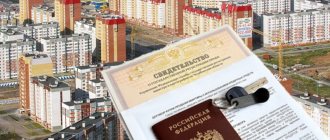Of course, after several years, this housing can be purchased at a very attractive price through privatization. But some citizens are denied such a procedure, but for understandable reasons established by law.
You need to know in what cases a refusal to privatize an apartment may occur and try to protect yourself in advance from such incidents.
Reasons for refusal
As we know, privatization of an apartment involves the acquisition of ownership of real estate from the state.
This method of obtaining property is very popular in our country, because not every citizen with the current level of prices and wages is able to purchase housing on their own.
But there are often pitfalls that you should pay attention to in advance.
Perhaps the fact that you miss the information in the early stages that you cannot privatize an apartment will play a cruel joke on you and you will waste your time.
Let's consider what could be the reasons for refusal to privatize an apartment.
State authorities refuse to privatize you for several reasons .
- Firstly, if the apartment or other housing has already been privatized by someone , and the fact that you were moved into a still empty premises is a pure formality.
- Secondly, privatization is not carried out in housing , which has a special status .
- Also, privatization may not be carried out due to your behavior .
We will talk about all these reasons in more detail in the following paragraphs and tell you how you can try to avoid such misunderstandings.
We also recommend that you read the guide, which will tell you who has the right to privatization and who is deprived of it. It happens that not all apartment owners agree to privatize their housing, what should be done in this case is described here.
Shared privatization of housing is described in the article. After reading it, you will know who the owner and heir of such housing is.
There is such a concept in the housing code as the special status of housing. Of course, it can be used in both a good and bad way. Let's talk about statuses that directly affect the refusal to privatize an apartment (grounds for refusal).
A house in which one cannot live without harm to life or health acquires the status of an emergency condition
Unfortunately, the lists of emergency housing are growing from year to year, and the administration simply does not have the funds to carry out timely repairs or provide people with other living space.
In this regard, citizens remain living under a social tenancy agreement in a dilapidated house, but they cannot privatize an apartment in it or in a new house.
It turns out to be a kind of injustice, but otherwise it may be contrary to the law.
The status of housing belonging to the department of some service also does not allow privatization. This category includes any official housing. It is impossible to privatize an apartment, because the housing stock is not under the department of the state, but under the department of a specific organization.
Also, you cannot privatize living space in a hostel . Unfortunately, such an action cannot be permitted by law.
Privatization is not carried out if the house is located in the department of social protection .
Therefore, before preparing documents for the privatization procedure, carefully make sure that you live in a house that does not belong to a specific category.
Opportunity to challenge
Any court decision made by the primary authority can be challenged in higher authorities. To do this, the parties are given 30 days, and this period begins to count from the moment they receive information about the verdict. If the defendant did not come to court, and the decision was sent to him by mail, then the period for challenging begins from the day the correspondence was received.
There are two instances for challenging court decisions:
- Appeal.
- Cassation.
In the case of privatization, claims are filed in district courts, which means an appeal is filed against their decisions. It is drawn up taking into account the requirements of the Civil Procedure Code. It should state when and by whom the decision was made, as well as justify the request to review the verdict. Upon review, a decision may be made:
- Leave the verdict unchanged.
- Change the decision made.
- Cancel it in some part.
- Make a new decision.
The appeal may be dismissed altogether if no compelling reasons for reconsideration are found. In all cases, the rendered verdict comes into force on the day of its announcement. If the complainant does not agree with this, he still has the right to file a cassation appeal.
What to do if you were illegally refused?
Of course, as in many other cases, the law on the privatization of an apartment can easily be violated. Unfortunately, this occurs everywhere, and judicial practice is literally replete with such cases.
Very often, unscrupulous officials try to take over apartments from the housing stock, regardless of the fact that people live there under a rental agreement.
In order to understand that the refusal was illegal and not justified, you need to know your rights well, as well as cases in which privatization may not be carried out.
Ask to justify the position of refusal . When you receive an answer, consult with a lawyer , providing him with all the papers, or try to study the law on privatization yourself .
If it turns out that the refusal was illegal, you can go to court and attract representatives of the administration who refused you such an action.
Making a decision
The trial may take several hearings if new facts or witnesses emerge, but a decision will eventually be made. Privatization proceedings are not always transparent and the plaintiff may be refused if he is unable to prove his claims or during the meeting facts hidden by him are revealed that contradict what was stated.
After the decision is announced, the parties are given time to challenge it. If this was not done within the specified period, a written form of the verdict is prepared. The plaintiff and the defendant receive the decision:
- Personally, if they came to court after the expiration of the deadline to receive the document.
- By mail. Letters are sent to the addresses specified in the claim.
After the court verdict is transferred to paper and handed over to the parties, they can take further actions based on it. If we are talking about satisfying the plaintiff’s demands, then he can begin to further formalize the procedure, from the moment at which he was stopped due to the circumstances that arose.
How to dispute?
Challenging a refusal to privatize is a very simple process. All you need is to make sure that you are in one way or another infringed on your rights.
To do this, you need to be well versed in the law, have the grounds for refusal in hand , and also contact a good lawyer. You can challenge the decision of the privatization commission without judicial intervention by simply writing a claim to them .
In it, state in detail what exactly you disagree with and justify why.
As a rule, if the administration representatives really made a mistake, at this stage their decision changes.
If both you and the members of the commission decide to go all the way, then you need to write a statement of claim and, after paying the state fee, submit it to the court along with the necessary documents.
Also read about whether it is possible to challenge the privatization of housing.
Trial
Registration of a claim and the documents attached to it does not yet guarantee that it will be accepted for consideration. Within three working days after being received by the office, the judge reviews the submitted papers and decides whether to schedule a trial or to refuse it. If the verdict is positive, the judge sets a hearing date. Notice of this in writing is sent to all parties involved in the process.
On the appointed day and hour, the plaintiff and defendant come to court to explain their position; authorized representatives can also defend their interests. During the hearing, the judge listens to both sides and, guided by the documents provided, makes a final decision.
The presence of a lawyer representing the interests of the plaintiff allows him to conduct the proceedings at a fairly high level. Citizens are not always able to correctly formulate thoughts and correctly present facts. But you can prepare for the process yourself in such a way as to get the desired result.
What to do next?
Don’t know what to do if your apartment is not privatized? You need to collect the correct package of documents . It should include:
- A photocopy of your passport so that the court can establish your identity;
- Lease agreement , according to which you lived in the apartment that you wanted to privatize;
- Written refusal from the privatization commission;
- Attach the paid state fee, or rather a receipt for its payment. As a rule, its amount is 300 rubles ;
- Take a certificate from utility companies stating that you regularly pay debts on receipts;
- Also take a certificate from the BTI .
If you have any other documents that would confirm the fact that you are applicants for privatization, please include them.
We are writing a statement of claim
It is also necessary to draw up a statement of claim , in which you state the essence of the situation in clear, concise legal language, and also refer to the law that, in your opinion, was violated against you.
Try to avoid being overly emotional when writing your statement.
When writing a statement of claim, use the services of a lawyer or carefully study the writing sequence and form yourself .
After all, only a correctly drafted application according to all canons will be accepted by the court for consideration.
The correct sample statement of claim can be found here.
Incorrect documents
We list the main reasons that may lead to a refusal in connection with documents:
- Failure to submit a document (agreement, order, etc.) that initially serves as the basis for the family to move into the residential premises. It is necessary to restore these papers in the organizations that allocated housing.
- Impossibility of submitting papers that served as the basis for moving in due to the absence (liquidation) of the organization. In this case, the issue will have to be resolved through a court that recognizes the right in accordance with Art. 18 Law of the Russian Federation dated July 4, 1991 No. 1541-1.
The grounds for refusal to privatize must be justified
Know your rights, because very often they are violated by other citizens.
The privatization process is not so complicated in its procedure, so if you face it in the future, spare no effort and study its main stages. The same goes for refusal.
You can learn more about the privatization process by reading articles on how you can privatize housing with debts, a cooperative apartment, a room in a communal apartment, municipal housing and a service apartment.
Only the right approach to business, as well as knowledge of our legislation, will help you to soon become the owner of your own living space.
Registration of rights
The court ruling, which announced the need to allow privatization, allows the procedure to be completed. A citizen can feel like a happy owner only after the re-registration of property rights has been carried out.
State registration of real estate is carried out in Rosreestr. To apply to this authority, the newly-minted owner must have a privatization agreement, which confirms the fact of transfer of rights from the municipal authorities to a private person.
State registration is carried out on a paid basis; before submitting documents to a specialist, you must pay the state fee.
The receipt is submitted along with the application to the registration authority. The procedure for entering new information lasts no more than 10 days, after which the privatization process can be considered completed.
Today, state registration of rights to privatized real estate can be carried out in several ways:
- Through Rosreestr.
- By contacting the MFC at the location of the living space.
- By submitting an application electronically through the State Services website.
A certificate of ownership of housing is no longer issued. The transfer of rights can be confirmed by an extract from the Unified State Register of Real Estate, which should be ordered separately after completion of the registration procedure.










